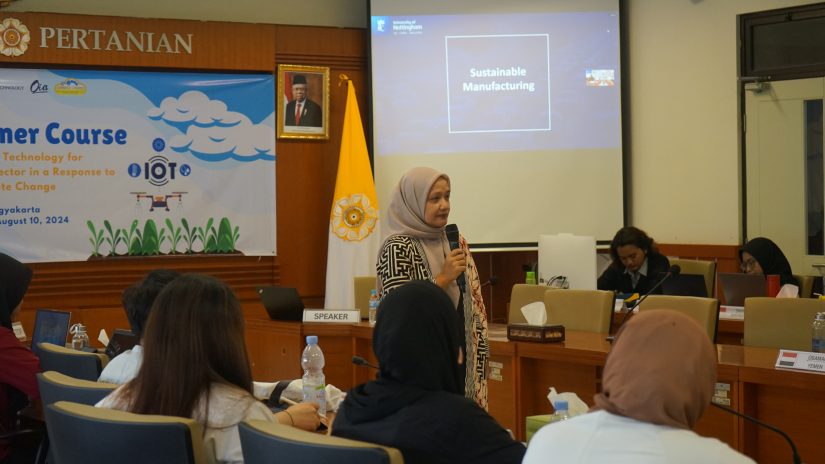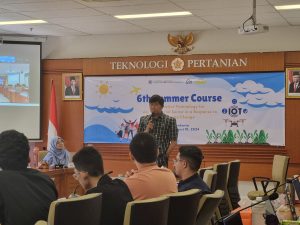
This morning, August 9th 2024, at 07.30 Western Indonesia Time (GMT+7), marked the 11th day of the Summer Course (SC) 2024 held by the Faculty of Agricultural Technology, Universitas Gadjah Mada.
 There were 4 speakers, 2 online and 2 on-site. The first lecture was on International Agricultural Development and Cooperation from Korea’s Perspective, moderated by Sintia Putri Pradita, M.Sc. from FAT UGM. Taeyoon Kim, Ph.D. from Seoul National University South Korea, explained about agricultural development especially related to GDP per capita with rural populations in Asian countries such as Japan and Korea from 1960 until now. He mentioned an example of food value implemented in the USA and agricultural contributions such as source of labor for the modern sector, saving for investment, foreign exchange through export, etc.
There were 4 speakers, 2 online and 2 on-site. The first lecture was on International Agricultural Development and Cooperation from Korea’s Perspective, moderated by Sintia Putri Pradita, M.Sc. from FAT UGM. Taeyoon Kim, Ph.D. from Seoul National University South Korea, explained about agricultural development especially related to GDP per capita with rural populations in Asian countries such as Japan and Korea from 1960 until now. He mentioned an example of food value implemented in the USA and agricultural contributions such as source of labor for the modern sector, saving for investment, foreign exchange through export, etc.
Before continuing to the next session, we had a coffee break from 09.15-09.45. The second lecture was on Reducing Food Waste with Food Packaging, moderated by Dr. Inasanti Pandan Wangi from FAT UGM. Dr. Nur Alim Bahmid (on-site speaker) from National Research and Innovation Agency of the Republic Indonesia, explained the importance of food packaging to reduce food waste. He then gave some examples of new innovations of packaging to extend product’s shelf life such as Modified Atmosphere Packaging (MAP), smart packaging, active packaging and intelligent packaging. He mentioned his brief research of antimicrobial packaging from mustard seed extracts to be incorporated in meat packaging.
The second session ended at 11.30 then we moved to the next session which was lunch break and prayer time. The plenary started at 13.00 for the third lecture on Sustainable Manufacturing. Dr. Novita Sakundarini (on-site speaker) from University of Nottingham Malaysia explained the facts about our planet and current issues about global warming and climate change. She gave understanding about the importance of protecting the Earth and urgency of achieving sustainable development goals (SDGs). She explained the new innovation for sustainable manufacturing such as AI and how industrial sectors such as Toyota, Niki and Ajinomoto implemented those policies in their company.
The fourth session started after a 30 minute coffee break around 15.15. It was about Agro-industrial Sustainability and Digital Transformation, moderated by Thalia Naziha, M.Sc., MBA from FAT UGM. Prof. Dr. rer. nat. Markus Frank from Nuertingen-Geislingen University, Germany explained the concept of agricultural sustainability by giving participants farming simulation (online exercise) through a website. He explained the biodiversity and intensive agriculture as well as future farming. He mentioned the advantages of a sustainable food system such as high resource efficiency, value orientation, direct contact between producer and consumer, etc.
